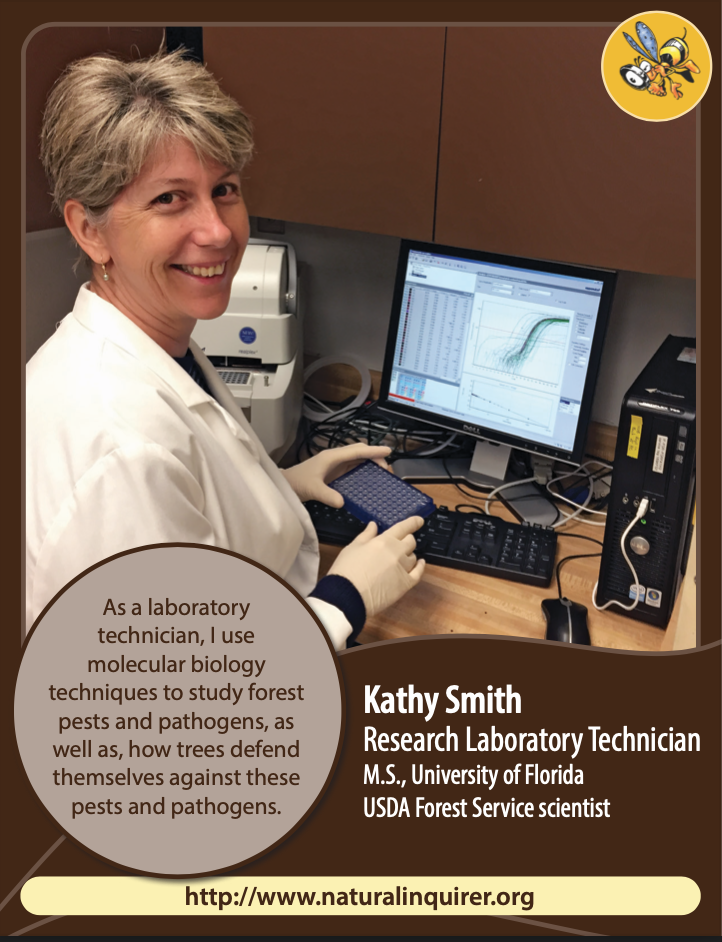Insects
Learn more about bark beetles, termites, the hemlock wooly adelgid, invasive insects, and more with a variety of Natural Inquirer resources. Browse by topic, grade band, and resource type.
-
 In the Spring 1999 edition, learn about a variety of topics from the Southern Research Station as well as types…
In the Spring 1999 edition, learn about a variety of topics from the Southern Research Station as well as types…In the Spring 1999 edition, learn about a variety of topics from the Southern Research Station as well as types of study design. Topics include the impact of black seed…
-

 Forests & PlantsInsects
Forests & PlantsInsectsNathan Havill, Molecular Ecologist

- Ph.D., Yale University
- USDA Forest Service Scientist
- As a molecular ecologist, I use genetic data to study how species interact, including how introduced species move around the world.
- Ph.D., Yale University
- USDA Forest Service Scientist
- As a molecular ecologist, I use genetic data to study how species interact, including how introduced species move around the world.
-

 Forests & PlantsInsects
Forests & PlantsInsectsLaurel Haavik, Forest Entomologist

- Ph.D., University of Arkansas
- USDA Forest Service Scientist
- A forest entomologist studies the habits of insects that live in forests.
- Ph.D., University of Arkansas
- USDA Forest Service Scientist
- A forest entomologist studies the habits of insects that live in forests.
-

 Insects
InsectsDoug Booher, Ecologist, Entomologist, and Evolutionary Biologist

- Ph.D., University of California, Los Angeles
- USDA Forest Service scientist
- As an ecologist and an entomologist, I study the functional importance native ants provide to ecosystems and the impacts invasive species have on native ant communities. As a taxonomist, I describe new ant species.
- Ph.D., University of California, Los Angeles
- USDA Forest Service scientist
- As an ecologist and an entomologist, I study the functional importance native ants provide to ecosystems and the impacts invasive species have on native ant communities. As a taxonomist, I describe new ant species.
-

 Insects
InsectsEmilee Poole, Entomologist

- Ph.D., University of Georgia
- USDA Forest Service scientist
- As an entomologist, I’m interested in the interactions between plants and insects. I study forest health by looking at native and invasive pests, their impact on our forests, and potential management strategies.
- Ph.D., University of Georgia
- USDA Forest Service scientist
- As an entomologist, I’m interested in the interactions between plants and insects. I study forest health by looking at native and invasive pests, their impact on our forests, and potential management strategies.
-

 FireForests & PlantsInsectsWildlife
FireForests & PlantsInsectsWildlifePaulette Ford, Research Ecologist

- Ph.D., University of Arizona
- USDA Forest Service Scientist
- An ecologist studies the relationships between living organisms and their environment.
- Ph.D., University of Arizona
- USDA Forest Service Scientist
- An ecologist studies the relationships between living organisms and their environment.
-

 FireInsectsWildlife
FireInsectsWildlifeBrian E. Dickerson, Wildlife Biologist

- M.S., Texas State University
- USDA Forest Service Scientist
- A wildlife biologist studies wild animals in their habitats. A wildlife biologist applies this knowledge to maintain populations of wild animals for future generations.
- M.S., Texas State University
- USDA Forest Service Scientist
- A wildlife biologist studies wild animals in their habitats. A wildlife biologist applies this knowledge to maintain populations of wild animals for future generations.
-

 Forests & PlantsInsectsWildlife
Forests & PlantsInsectsWildlifeWayne J. Arendt, Research Ornithologist

- Ph.D., University of Wisconsin-Madison
- USDA Forest Service Scientist
- I study disturbance ecology, climate change, conservation and management of Neotropical resident and migratory bird communities, and invasive species.
- Ph.D., University of Wisconsin-Madison
- USDA Forest Service Scientist
- I study disturbance ecology, climate change, conservation and management of Neotropical resident and migratory bird communities, and invasive species.
-

 Forests & PlantsInsects
Forests & PlantsInsectsKathy Smith, Research Laboratory Technician

- M.S., University of Florida
- USDA Forest Service Scientist
- As a laboratory technician, I use molecular biology techniques to study forest pests and pathogens, as well as, how trees defend themselves against these pests and pathogens.
- M.S., University of Florida
- USDA Forest Service Scientist
- As a laboratory technician, I use molecular biology techniques to study forest pests and pathogens, as well as, how trees defend themselves against these pests and pathogens.
-

 Forests & PlantsWildlife
Forests & PlantsWildlifeRima Lucardi, Plant, Molecular, & Invasion Ecologist

- Ph.D., Mississippi State University
- USDA Forest Service Scientist
- An ecologist studies low organisms interact with each other and the environment. I use genetic tools to answer ecological questions related to plants and invasive species.
- Ph.D., Mississippi State University
- USDA Forest Service Scientist
- An ecologist studies low organisms interact with each other and the environment. I use genetic tools to answer ecological questions related to plants and invasive species.











